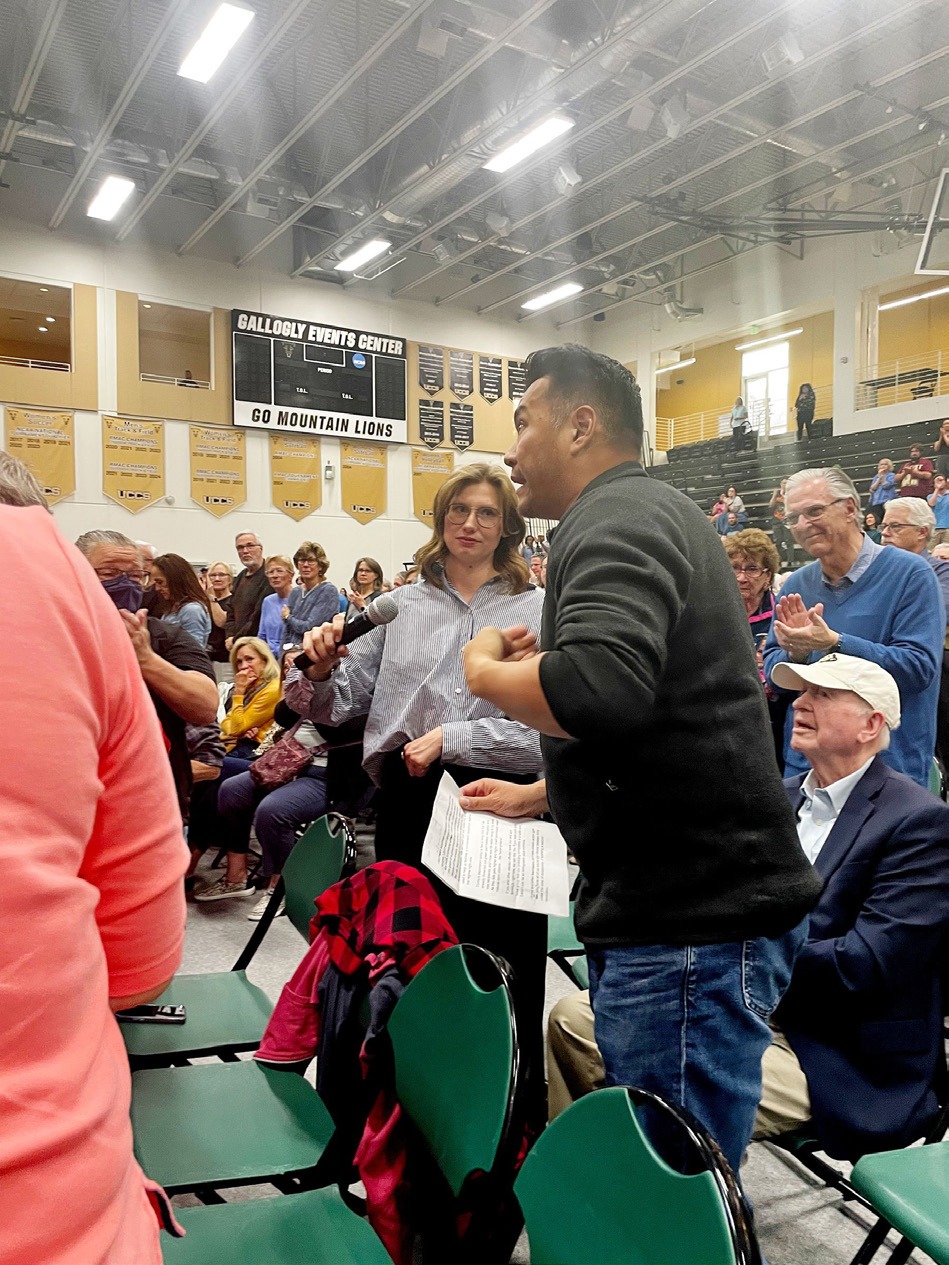Navy veteran Pablo Capistrano stood up in the middle of Gallogly Hall at the University of Colorado – Colorado Springs, glanced at the typed notes he was holding, and started to tell his story to the crowd gathered for Sen. John Hickenlooper’s April 17 town hall.
His parents had brought him to the United States from the Philippines when he was two, he said. The family was undocumented when they arrived but were among some 2.7 million people who got permanent residence after President Ronald Reagan signed the Immigration Reform and Control Act of 1986, often called “the Reagan Amnesty.”
After growing up in California, Texas, and Illinois, Capistrano became a U.S. citizen in 1996, halfway through the ROTC program at Iowa State University, and commissioned into the Navy when he graduated in 1999. Joining the military was his way of thanking the country he’d always called home, he told the audience of hundreds, still reading from his notes.
Then, he went off script.

‘Working without any rules’
“I spent 20 years in the Navy, with multiple deployments to Iraq and Afghanistan, but my bet is ICE doesn’t care about that if they roll me up tomorrow,” Capistrano said.
“They won’t care if I’m naturalized … They appear to be working without any rules,” he said.
Under U.S. law, citizens – whether naturalized or natural born – can not be deported. But the Trump administration has ignored court orders issued over deportation and other policy disputes up to now.
Capistrano, who got a job as a defense contractor in Colorado Springs after leaving the Navy, said he has compiled a to-do list for his wife if he doesn’t come home one day: Check these websites to see where the authorities might be holding him, call this immigration attorney, ask these people for help.
“The danger feels terribly real for us,” he said. “You might think I’m overreacting, but I really don’t think I am.”
It’s impossible to say how many veterans have been “removed” from the United States because U.S. Immigration and Customs Enforcement (ICE) “does not consistently identify and track” them, according to a 2019 Government Accountability Office report on deported noncitizen veterans. But some veterans’ groups estimate that nearly 100,000 have been deported since the passage of the Illegal Immigration Reform and Immigrant Responsibility Act of 1996.
We never leave each other behind. Never. – Manny Valenzuela, Vietnam veteran
The possibility of being mistakenly deported has increased in Trump’s second term “as immigration officials become more indiscriminate about who they’re targeting – all while they’re pressured to deport people faster and to avoid immigration court proceedings,” said César Cuauhtémoc García Hernández, a law professor at Ohio State University, in an April 7 Washington Post article.
“[C]itizenship is not something that we can spot on people’s foreheads,” Garcia Hernández added.
‘We never leave each other behind’
Veterans being deported after serving the United States is nothing new, said James Smith of Black Deported Veterans of America, which works to stop the deportations of former military members, regardless of race or ethnicity, and bring back those who have already been removed.
Colorado Springs resident Manny Valenzuela is “one of the originals that fought this battle,” Smith told the Pikes Peak Bulletin in a phone conversation. “He and his brother, Valente, were given removal notices in 2009 when they went to the VA to check for their benefits.”
The Valenzuelas’ mother was American. They grew up in the United States, and both fought in Vietnam, Manny as a Marine and Valente as a soldier. They were threatened with deportation after they were found to have misdemeanor records for minor infractions committed in the 1970s and ’80s.
The case against them was dropped after a year, but it scarred Manny.
“Veterans being deported, that took me back to ‘Nam where we had to carry each other back in pieces,” he said in a phone conversation.
“Now, I go to veterans’ organizations and say, ‘We gotta stick together and get stronger. If we allow this to happen, it’s going to get worse.’ We have to stand up and say we won’t accept it,” 73-year-old Manny said.
“We never leave each other behind. Never.”

The ‘rising tide’ of deportation
At the April town hall, Capistrano had a similar warning – and not just for veterans.
“Trump’s deportation policy is a rising tide that has already drowned Green Card holders, refugees and visa recipients,” he said.
“As this tide gets higher and higher, it will eventually reach natural-born citizens … the ‘home-growns,'” he warned, referencing the term Trump used when he met Salvadoran President Nayib Bukele at the White House days before the town hall.
“The home-growns are next, the home-growns,” media reports quoted Trump as telling Bukele. El Salvador would have to “build about five more places” – massive prison facilities like CECOT – to house the U.S. citizens who would be deported, the U.S. president said.
Capistrano spoke at Hickenlooper’s town hall because he wanted to “shift the tone of the conversation to, ‘This is not normal,'” he told the Pikes Peak Bulletin.
“We are in a national emergency, and I want my lawmakers to act accordingly,” he said.
And shouting above the applause and cheers of the crowd, he called on Hickenlooper and his fellow legislators “to throw sand in the gears of a government that is disappearing innocent people off the streets, that wants to denaturalize veterans like me, that is defying court orders and punishing First Amendment speech.”
In his second term, President Donald Trump’s directives have impacted global trade, international relations, immigration, research, education and more in the United States and beyond – and the lives of local residents. In our “Trump 2.0” series, we’re telling the stories of Pikes Peak region residents whose lives have been impacted by these changes. We start with veterans who fear the new immigration and deportation policies might lead to their removal from the nation they’ve served.

